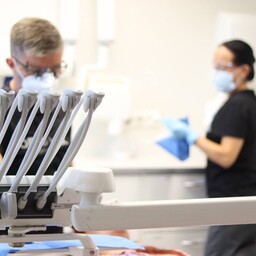Möödunud aastal kasutas hambaravihüvitist umbes 40% täiskasvanutest. See oli rohkem kui eelmisel aastal.
Riigi poolt makstud hambaravi maksumus
oli ligi 29 miljonit eurot. See on 39% rohkem kui 2023. aastal.
Üle 400 000 inimese kasutas hüvitist
, mis on 21 000 inimest rohkem kui eelmisel aastal.
Riigi poolt makstud hambaravi maksumus
Tõlge fraasile: Riigi poolt makstud hambaravi maksumus
EN
cost of dental care paid by the state
Üle 400 000 inimese kasutas hüvitist
Tõlge fraasile: Üle 400 000 inimese kasutas hüvitist
EN
over 400,000 people used the subsidy
Täiskasvanute hambaravihüvitis oli 97% kasutatud
.
Tulevaste aastate eelarve põhineb eelmise aasta kasutuse ja kasvuprotsendi peal
.
Täiskasvanute hambaravihüvitis oli 97% kasutatud
Tõlge fraasile: Täiskasvanute hambaravihüvitis oli 97% kasutatud
EN
97% of adult dental care subsidies were used
Tulevaste aastate eelarve põhineb eelmise aasta kasutuse ja kasvuprotsendi peal
Tõlge fraasile: Tulevaste aastate eelarve põhineb eelmise aasta kasutuse ja kasvuprotsendi peal
EN
the budget for future years is based on last year's usage and growth percentage
Hambaravi vajadus kasvab pidevalt.
Eestlaste suutervis ei ole hea
ja rahvas ei hoolitse piisavalt oma hammaste eest. Kui mõni teenus jääb kasutamata, suunatakse raha teistesse teenustesse.
Eestlaste suutervis ei ole hea
Tõlge fraasile: Eestlaste suutervis ei ole hea
EN
the oral health of Estonians is not good
Hambaravi eelarvest rahastatakse mitmesuguseid teenuseid
:
laste suuõõne haiguste ennetamine ja ravi
, täiskasvanute hambaravi, puudega inimeste ravi ja ortodontiline ravi. Seega saab pakkuda rohkem teenuseid.
Hambaravi eelarvest rahastatakse mitmesuguseid teenuseid
Tõlge fraasile: Hambaravi eelarvest rahastatakse mitmesuguseid teenuseid
EN
various services are funded from the dental care budget
laste suuõõne haiguste ennetamine ja ravi
Tõlge fraasile: laste suuõõne haiguste ennetamine ja ravi
EN
prevention and treatment of children's oral cavity diseases
Tervisekassa eelarve on pingeline
.
Aastane miinus on ligi 200 miljonit eurot
. Aastaks 2027 võib koroonaaegne reserv otsa saada. Seejärel tuleb mõelda muudest lahendustest.
Tervisekassa eelarve on pingeline
Tõlge fraasile: Tervisekassa eelarve on pingeline
EN
the Health Insurance Fund's budget is tight
Aastane miinus on ligi 200 miljonit eurot
Tõlge fraasile: Aastane miinus on ligi 200 miljonit eurot
EN
the annual deficit is around 200 million euros
Möödunud aastal pakkus tervisekassa välja hambaravihüvitise, kuid see jäi muutmata. Väga oluline on hoolitseda hammaste eest lihtsal viisil - juua piisavalt vett, süüa tervislikult,
hambaid pesta kaks korda päevas
ja puhata söögikordade vahel.
hambaid pesta kaks korda päevas
Tõlge fraasile: hambaid pesta kaks korda päevas
EN
brush teeth twice a day
Last year, about 40% of adults used the dental care benefit. This was more than the previous year.
The cost of dental care paid by the state was nearly 29 million euros. This is 39% more than in 2023. Over 400,000 people used the benefit, which is 21,000 more than the previous year.
97% of the dental care benefit for adults was used. The budget for future years is based on the previous year's usage and growth percentage.
The need for dental care is constantly increasing. The oral health of Estonians is not good, and people do not take enough care of their teeth. If some services remain unused, the funds are redirected to other services.
The dental care budget funds various services: prevention and treatment of oral diseases in children, adult dental care, treatment for people with disabilities, and orthodontic treatment. Therefore, more services can be offered.
The Health Insurance Fund's budget is tight. The annual deficit is nearly 200 million euros. By 2027, the COVID-era reserve may run out. Then, other solutions will need to be considered.
Last year, the Health Insurance Fund offered a dental care benefit, but it remained unchanged. It is very important to take care of your teeth in a simple way - drink enough water, eat healthily, brush your teeth twice a day, and rest between meals.

